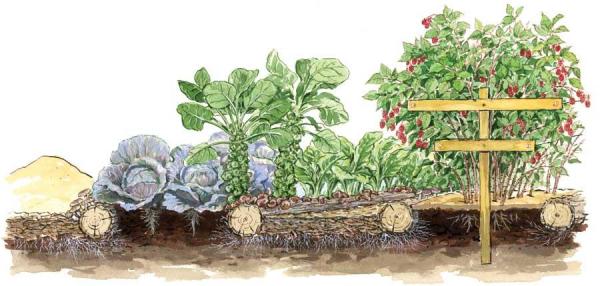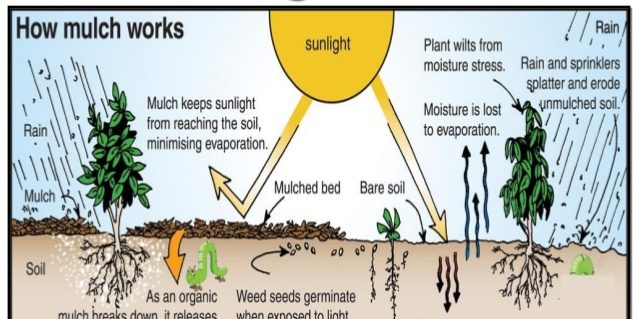Mulch is any material that is spread or laid over the surface of the soil as a covering – but organic mulches specifically help to improve the soil’s fertility, as they decompose.
Mulch is used to retain moisture in the soil, suppress weeds, keep the soil cool, and can also make the garden bed look more attractive.
Types of Organic Mulch
- Bark, Shredded or Chipped
- Compost
- Composted Manure
- Grass Clippings
- Newspaper
- Shredded Leaves
- Straw
Why We Need to Mulch
Mulching is an important part of generating and maintaining the rich soil we need to sustain our permaculture plot – making it the first and last thing we need to consider as we take our plot from grass to earth beds, and then when we look to continue revitalising the soil for planting in future.
To help answer the question of how we do this, we can look to nature…

By providing food for fungi, wood mulch builds garden soil by increasing levels of organic matter in your garden beds. ILLUSTRATION: ELAYNE SEARS
As Mother Earth News identifies:
When it comes to building richer soil, nature’s plan relies heavily on trees — fallen limbs, leaves, cones, seeds and, eventually, the massive trunks. Adapting this plan for building garden soil by using a wood mulch — such as wood chips, sawdust or other woody residues — is a strategy that promises huge, long-term returns.
However, because woody materials are high in carbon and cellulose, nitrogen and time are needed to aid decomposition.
We need to be aware that the dryer and woodier the mulch, the slower it will decompose and the fewer nutrients it will give to the soil. So the key thing is to have a natural balance of organic material to prevent too much of one thing (like the carbon or fungi) having an adverse impact.
We should consider mulching with a variety of organic matter to help provide our soil with a variety of nutrients as well as to benefit from the ways that each type of mulch can help us retain moisture in the soil, suppress weeds and keep the soil warm or cool.
How We Do It…
This 7 minute video from Geoff Lawton shows just how easy it is to build a planting bed starting from an organic mulch.








